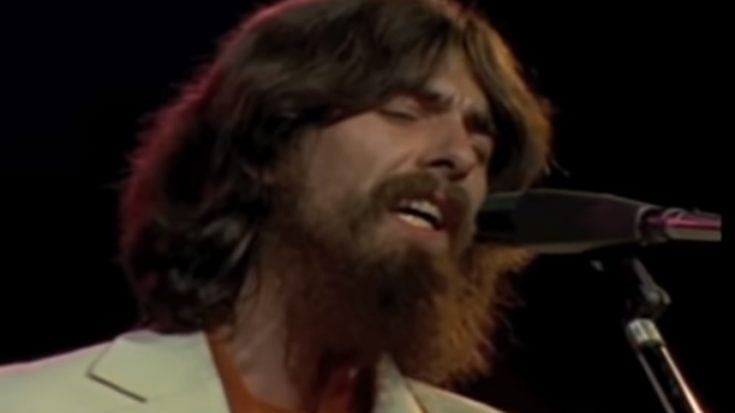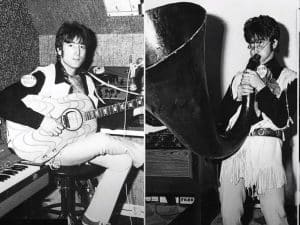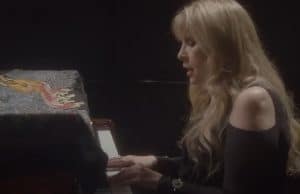5 Iconic Rock Songs That Tests Your Spirituality

George Harrison - albumania / YouTube
Classic rock songs often delve into relatable, everyday themes, providing a down-to-earth perspective. However, there are instances when rock musicians venture into more profound inquiries, prompting contemplation about the purpose of our existence and our role in the vast universe.
While these five songs may not revolve around the typical themes of partying and letting loose, their captivating melodies and arrangements make them just as enjoyable for a good time.
Despite the departure from the conventional rock vibe, these songs prove that the essence of rock ‘n’ roll transcends thematic boundaries, emphasizing that, in the end, it’s all about the music.
1. “What Is Life” by George Harrison
Within the mesmerizing track “What Is Life” from the album All Things Must Pass, George Harrison delves into the profound realm of spiritual contemplation. Through the soulful lyrics, Harrison poses the ultimate question about the meaning of life, offering a straightforward response in the emotive chorus.
The Quiet Beatle poignantly inquires: “Tell me, what is my life without your love? And tell me, who am I without you by my side?”
The ambiguity surrounding the identity of the “you” in Harrison’s lyrics adds a layer of intrigue. While some listeners may interpret the song as a conventional love ballad, Harrison’s deeper spiritual exploration becomes apparent upon closer examination.
Although the lyrics remain open to interpretation, the context of Harrison’s well-documented spiritual journey in the years leading up to the recording of All Things Must Pass provides a compelling backdrop. Considering this backdrop, it becomes plausible to infer that “What Is Life” is a poignant expression of Harrison’s relationship with a higher spiritual force, further enriching the depth and significance of the song.
2. “Into the Mystic” by Van Morrison
Within the enchanting track “Into the Mystic” from the album Moondance, Van Morrison skillfully crafts a vivid tapestry of a spiritual odyssey on the water. Imbued with sensory imagery, the lyrics beckon listeners to immerse themselves in the experience: “Smell the sea and feel the sky / Let your soul and spirit fly into the mystic”.
Morrison orchestrates a multisensory journey, complete with saxophones mimicking the haunting tones of a foghorn, thereby intricately setting the atmospheric stage. The melodic interplay, highlighted by gentle guitars, gently envelops the audience, inducing a tranquil state.
However, Morrison’s intention goes beyond merely inducing relaxation; he seeks to cultivate a serene ambiance that, for him, represents a return to his spiritual core. This becomes evident as he poetically declares in the pre-chorus, “When that foghorn blows / You know I will be coming home”.
Morrison’s lyrical artistry not only creates a calming mood but also serves as a metaphorical vessel for a deeper, soulful journey. The song’s tranquil allure becomes a metaphor for Morrison’s quest for a spiritual homecoming, making “Into the Mystic” a poignant exploration of the artist’s connection to a profound, inner realm.
3. “The Logical Song” by Supertramp
Written by Supertramp vocalist and co-founder Roger Hodgson, “The Logical Song” unfolds as a poignant narrative, recounting his formative years spent in a boarding school. The song talks about Hodgson’s personal journey, shedding light on an educational experience that prioritized societal assimilation over self-discovery and understanding one’s true purpose in the world.
In the opening verses, Hodgson paints a nostalgic picture of his pre-boarding-school self—a time when life was perceived as wonderful, a miraculous and beautiful experience. The imagery of birds joyfully singing in the trees encapsulates the innocence and playfulness that characterized his early connection with the world.
However, the transition to boarding school marked a profound shift in Hodgson’s perspective. Despite the institution’s intent to mold him into a socially accepted member of society, Hodgson found himself yearning for a deeper understanding of his true self and his purpose in the world.
The lyrics poignantly capture Hodgson’s defiance against becoming a mere cog in the societal machine. While the educational system failed to recognize the value of the kind of learning Hodgson sought, he remained steadfast in asking questions that “run too deep for such a simple man”. The song becomes a reflection on the limitations of conventional education and the enduring human quest for a more profound understanding of oneself and the world.
4. “The Chamber of 32 Doors” by Genesis
Nestled in the heart of Genesis’ intricately woven four-sided concept album, The Lamb Lies Down on Broadway, lies the profound and enigmatic track, “The Chamber of 32 Doors”.
Within the album’s overarching narrative, which disguises spiritual exploration beneath the surreal tale of a young Puerto Rican New Yorker named Rael, this particular composition stands out as a deeper cut, tackling the complexities of the protagonist’s quest for guidance and understanding.
Rael, portrayed by Peter Gabriel’s lyrical craftsmanship, embarks on a disorienting journey within a vast, crowded room. His goal: to discover a doorway that leads to someone capable of illuminating his path. Through Gabriel’s verses, listeners are led through Rael’s poignant quest, where various figures, including priests, magicians, academics, and even his parents, attempt to assist him. Despite their efforts, each door entered only circles back to the chamber where the journey began, leaving Rael in a perpetual state of confusion.
In the culminating verses, Gabriel eloquently encapsulates the frustration inherent in an endless search for meaning and direction: “Back inside this chamber of so many doors / I’ve nowhere, nowhere to hide / I’d give you all of my dreams / If you’d help me find a door / That doesn’t lead me back again / Take me away.”
5. “What Is Life” by George Harrison
In Kansas’ first hit single, “Carry on Wayward Son”, the listener is treated to more than just the elaborate musical arrangement and soaring harmonies that characterize the track.
Behind the façade of its captivating sound, Kerry Livgren’s lyrics unfold a narrative of profound spiritual exploration, drawing parallels to the arduous journey depicted in “The Chamber of 32 Doors”. Livgren candidly shared that the song mirrors his personal quest for spiritual understanding, drawing a poignant comparison to the mythical Icarus.
The verses echo Livgren’s tumultuous spiritual odyssey, where he recounts having risen above the “noise and confusion” to catch a fleeting glimpse beyond the illusions of life. The metaphorical flight took him higher and higher until, akin to Icarus, he flew too close to the sun and faced the consequences. The vivid imagery of being “tossed about like a ship on the ocean” vividly captures the challenges and turbulence of Livgren’s quest for meaning.
Yet, amidst the struggles, Livgren imparts a message of hope and resilience. The chorus serves as a powerful mantra, echoing a reassuring call to persevere: “Carry on, my wayward son / There’ll be peace when you are done”.











